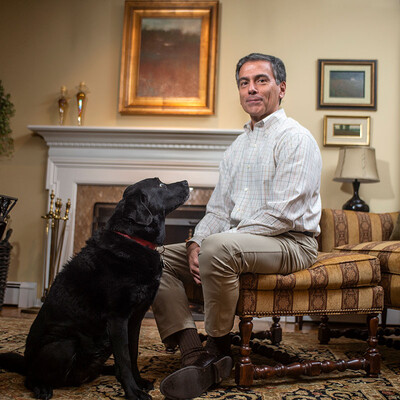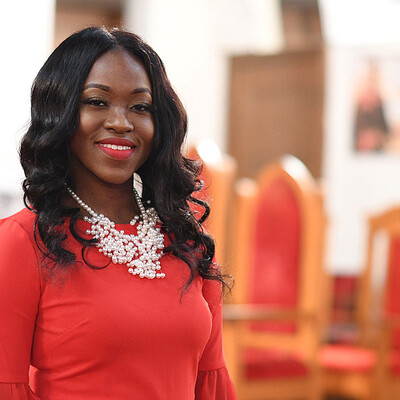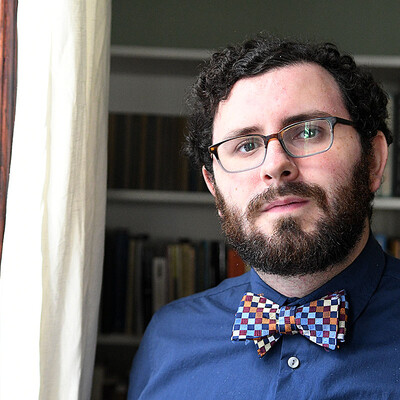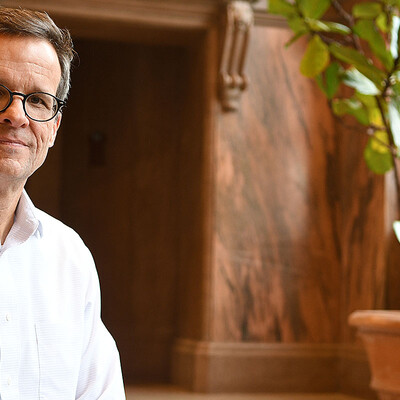‘Thou shalt not bear false witness’: Ninth Commandment goes to Princeton
Loading...
| Princeton, N.J.
At Princeton University, you’d better have your facts right. Especially if your topics are sensitive, misunderstood, or controversial. If you’re wrong, you can count on someone here to set you straight. If not that, 10 libraries are within steps of you, their stacks just begging to challenge your conclusions.
One person who’s up for the challenge is Alexi Sargeant. He’s an artist at heart and an ideas person by temperament, and he has a fact-checker’s conscience, making him keenly aware of the value of truth in argument and principle. Managing director of the Aquinas Institute, the university’s Roman Catholic campus ministry, he spoke to the Monitor about the Ninth Commandment – Thou shalt not bear false witness against thy neighbour (Exodus 20:16). The conversation was part of our series exploring ways in which the Ten Commandments’ ancient concepts continue to matter in modern life.
“I was an extremely bookish kid,” says Mr. Sargeant, whose dining room features a shrine-like homage to William Shakespeare, complete with a nearly life-size bust. His appetite for “thick books,” along with his boredom in public school, led his parents to home-school him from third grade through high school. He went on to get a degree in English and theater at Yale. While he was there, he – as well as his parents and siblings in Pennsylvania – converted to Catholicism. The conversion was a long time coming, he says, the Episcopal Church of his childhood finally too “fractured” for the family’s liking.
Why We Wrote This
Alexi Sargeant has a distinctive approach to honoring the truth – the heart of the Ninth Commandment – in both personal and professional endeavors. Part 10 in a series looking at the Ten Commandments through modern lives.
It was his college debate club that gave Mr. Sargeant’s understanding of the Ninth Commandment a workout. At the time he was full of “nerdy” questions: “What is truth? How do we get there? What does that mean for our lives?” His most convincing interactions were with what he terms “traditionalist Catholic” students, a minority in a mainly libertarian group. In a reference to his conversion, he says the students “helped pull me across the Tiber.”
Recruited together
After graduation and work in publishing, Mr. Sargeant – and his wife, writer Leah Libresco Sargeant – were recruited to serve as staff and resident role-model couple for the Aquinas Institute. Here, the young couple aim to round out an already robust worship community with the intellectual and social side of Catholicism via lectures, debates, and plays. Mrs. Sargeant, a fellow Yale alum, is a former atheist who also is a Catholic convert.
The views that Mr. Sargeant holds now with so much conviction can be flashpoints in the worlds he straddles: education, religion, theater, art, publishing, and even game design. “I know there are people who would object to things I believe in as a Catholic,” he says.
He grapples with the need for integrity in the ways he presents himself. “Is forthrightness the thing I’m called to do? I don’t know if I live up to that.” But he tries. “I’m pretty consistent about wearing a cross necklace wherever I go,” he offers as an example. The piece reminds him of his own convictions, sends a signal to kindred spirits, and holds the hope of mending any perceived wrongs that may have been inflicted by his faith-mates. “I want those even with legitimate problems with Christians they’ve encountered to encounter me as kind and gentle,” he says.
Mr. Sargeant can walk from his home in town through the Gothic-style campus to the 1880s Murray-Dodge Hall, which hosts religious groups at Princeton. A recent evening seminar and supper he hosted there took up Titian’s painting “Presentation of the Virgin in the Temple” and Isak Dinesen’s short story “Babette’s Feast.” The aim: to discuss how Catholic practices of fasting and feasting, both literal and figurative, might connect with ordinary life.
Arthur Acuna, who hails from Las Vegas, would seem an unlikely attendee of such an event. He’s a freshman chemical and biological engineering student, and rarely has time amid his studies for what he calls “the aesthetics.” Still, Mr. Acuna attended not only this event, but also most of the other six seminar meetings organized by Mr. Sargeant this semester.
The conversation on fasting and feasting resonated with Mr. Acuna. “I came to realize that these seemingly minute tasks, if you take the time to look at them, and why we do them in the first place, are beautiful – that the means of nourishment, and how we intake that nourishment, elevates us in daily life,” he says.
Fact-checker stint
In dealing with his charges, Mr. Sargeant makes sure to separate fact from fable, a holdover from his stint as proofreader and fact-checker for Magnificat. The prayer book, published monthly, runs a regular feature on Catholic saints. While many of the saints have strong historical records, others’ stories are shrouded in folklore or pious legend. When editing the feature, he sought to clarify the stories in ways that honored the truth without judging their validity. “I’d add tags, consistent with my philosophy that we do want to distinguish those things,” he says.
Claire Gilligan, Mr. Sargeant’s friend and predecessor at Magnificat, recruited him to be her replacement knowing that the religion side of the job would appeal to his faith, while his judgment, integrity, work ethic, and smarts would make him good at it. “He works hard and absorbs a lot of things in great nuance,” she says. “I knew that he would be meticulous about anything he cared about.”
Ms. Gilligan had been swept into the Sargeants’ inclusive and diverse circle of friends one day after church, when they were networking for a play reading. The couple are known for “skillet cookie” gatherings of friends at their home, where vigorous conversation is the hallmark and the prevailing ethos is “I don’t care what you think, but that you think.”
“They’re careful about their lives bearing witness to reality,” Ms. Gilligan says of the couple. They’ve encouraged her to do the same. When she shifted from a career in theology to one in software engineering, the single piece of advice Mr. Sargeant had for her was to “work someplace that matters.”
One stumbling block
As acknowledged by Mr. Sargeant, one stumbling block – especially across an ideological divide – are words themselves. A telling example when it comes to life issues is the classic “fetus” versus “baby.” “Some of the most interesting conversations we have had across the divide have been with people willing to work out what lexicon to use, or with people willing to [set aside] the language” in the interest of an exchange of ideas, he says.
That language has become personal for the Sargeants through the course of repeated miscarriages they have suffered. In particular, they felt that as their miscarriages were taking place, the doctors shifted their language away from talking about “the baby” too quickly. “We felt that wasn’t being true to the reality we were experiencing,” Mr. Sargeant explains. The couple are expecting a daughter, Beatrice, in January.
It also follows that Mr. Sargeant wants scrupulous honesty in the discussion of life issues. “When stakes are high, there’s the temptation to grab a piece of evidence without putting it through the rigor of fact-checking,” he says. He is not convinced, for instance, that there is evidence for a link between breast cancer and abortion, something often cited by anti-abortion activists. “The imperative is never only to pursue an end, but to pursue it virtuously,” he says. “If the goal [of life] is union with God – who is truth, beauty, and goodness – then adopting evil means is self-defeating.”
He adds, “I aspire to be a good example in these conversations – to win a convert, not just an argument.”
Counsel on a T-shirt
If there’s a perfect marriage of art, intellect, and morality for Mr. Sargeant, it would have to be his recent direction of the reading of “Equivocation” for Princeton’s Being Human festival. Shakespeare with a twist, the Bill Cain play centers on the Gunpowder Plot, a failed attempt by English Catholics to take the life of King James I. With its central moral dilemma whether to equivocate and betray moral principles or risk life for truth, it shines a light on the integrity of the question at hand.
These may be complex thoughts for a complex time, but not for Mr. Sargeant. With a flourish worthy of the Bard himself, he flashes a T-shirt he’s wearing under his flannel. It cites the play’s conclusion: “Answer the question really asked. And answer it with – your – life.”
Part 1: The Commandments as a moral source code in modern life
Part 2: How does the First Commandment fit in today?
Part 3: ‘I have to have humility’: How Second Commandment helped man find freedom
Part 4: One woman embraces Third Commandment in feeding 1,600 at Thanksgiving
Part 5: ‘Remember the sabbath’: How one family lives the Fourth Commandment
Part 6: ‘Growing up is hard’: How Fifth Commandment guided a child during divorce
Part 7: Is saying ‘I’d kill for those shoes’ OK? One woman and Sixth Commandment.
Part 8: Is chastity old-fashioned? An NFL veteran’s take on Seventh Commandment.
Part 9: ‘Thou shalt not steal’: Even someone else’s joy, says one educator
Part 10: ‘Thou shalt not bear false witness’: Ninth Commandment goes to Princeton
Part 11: Jealousy at Ivy League level: How a law professor views Tenth Commandment


















